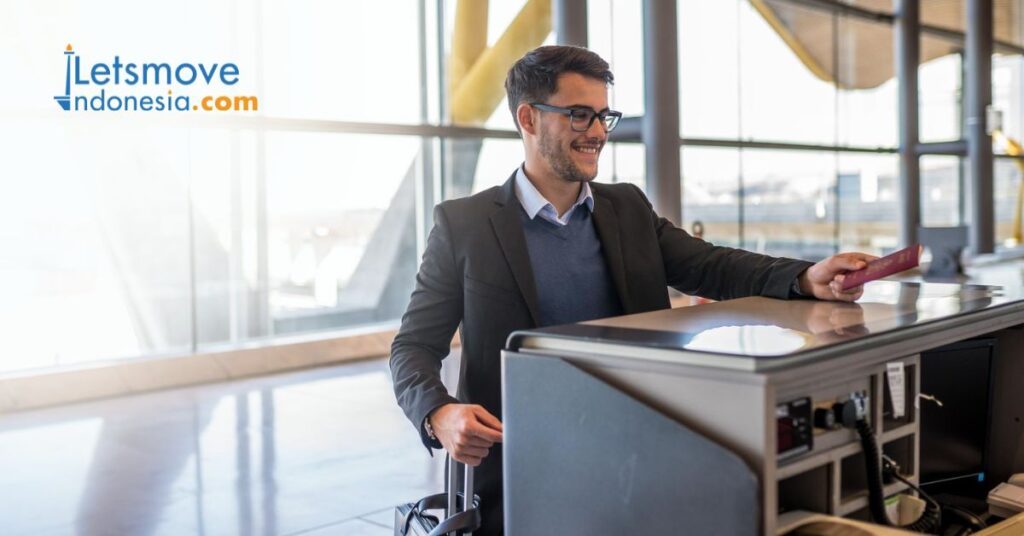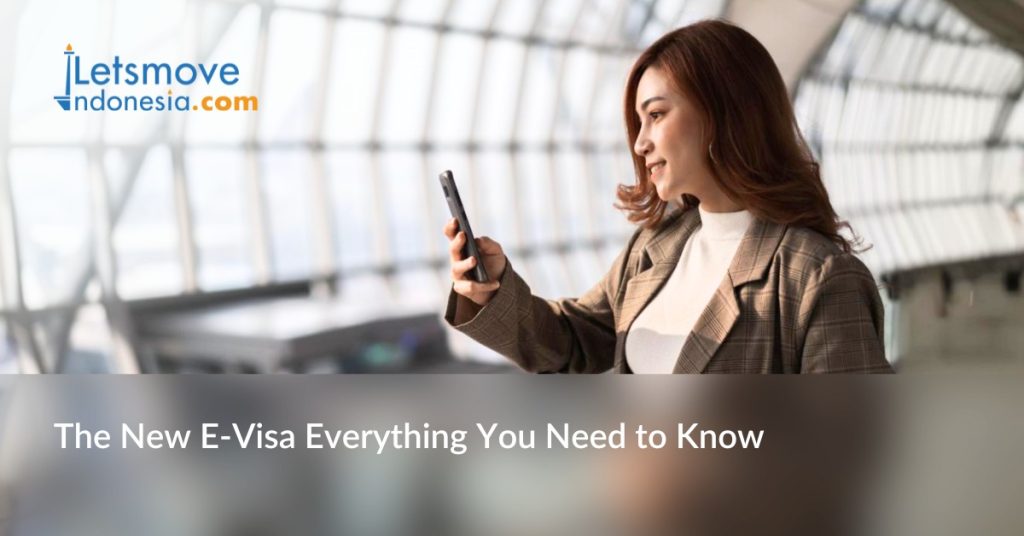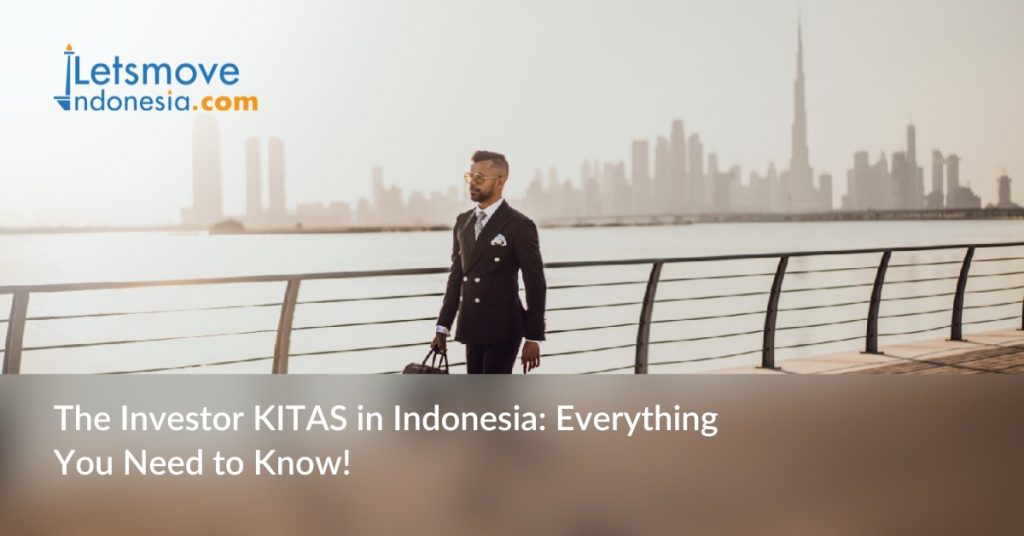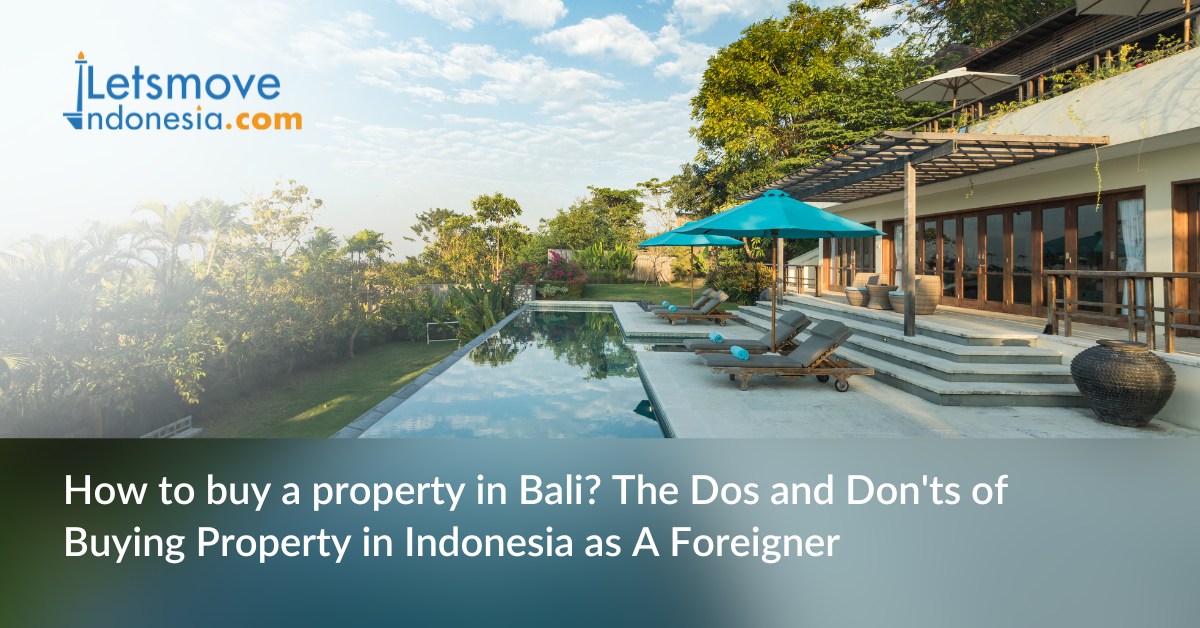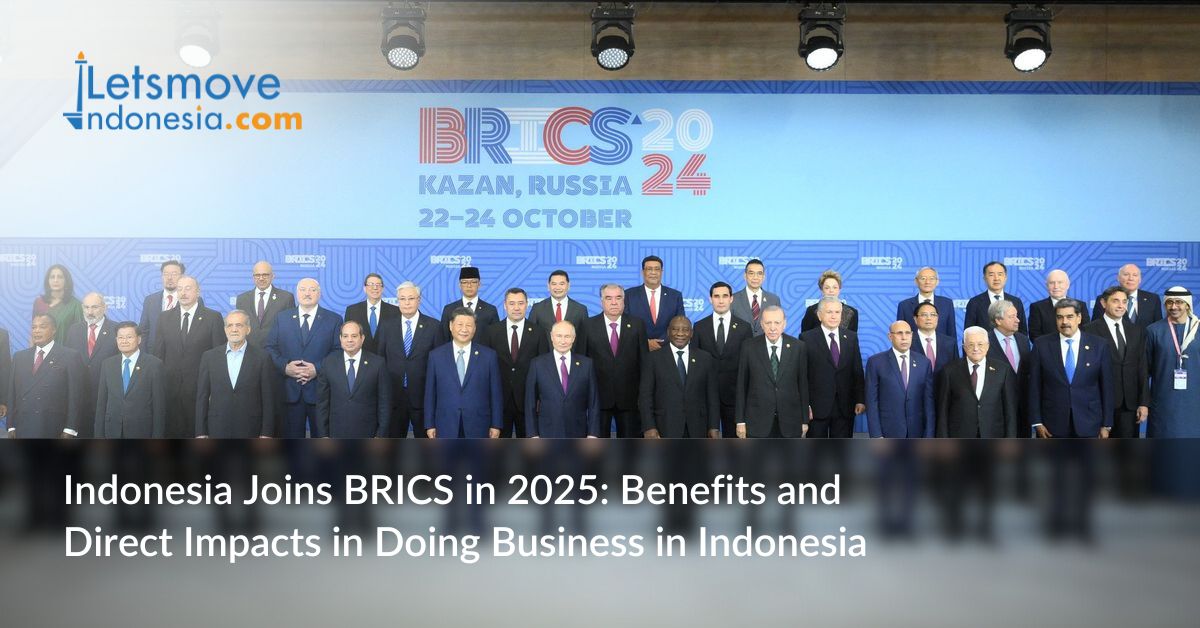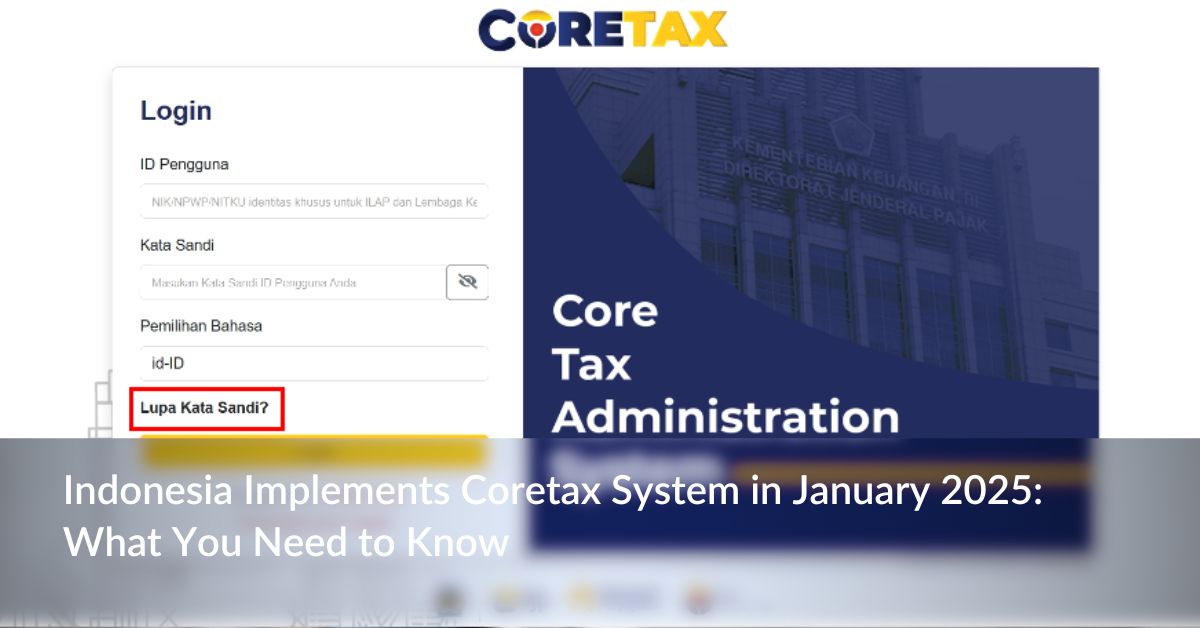- Home
- Legal Services
- Franchise License

Franchise License in Indonesia
Company Registration & Legal Services
- Share:
Franchise License Agreement – Who is it for and what are the benefits
A franchise business model is one of the best business agreement to be done in Indonesia to start up your business because, through franchise relationship, business owners don’t have to worry about things related to the business strategy. The franchise is a business where franchisors will be responsible in terms of planning, the operating system and the business strategy of the franchise, so you only need to carry out the operational system and procedures that have been informed by you when agreeing to the franchise business cooperation.
As easy as it sounds, starting a franchising business in Indonesia will also require you to adhere to Indonesia laws, as mandated through Peraturan Menteri Perdagangan (Ministry of Trade) No. 31/M-DAG/PER/8/2008 regarding the Implementation of Franchising. Both Franchisors and Franchisees must obtain a Franchise License or STPUW in order to set up a franchise business in Indonesia.
STPUW (Surat Tanda Pendaftaran Waralaba) acts as legal evidence that Franchisee has officially registered their names under the franchise agreement.
As a market-leading business consultancy in Indonesia, Lets Move Indonesia helps your franchise business to acquire the STPUW license, ensuring an efficient process and zero hassle when opening a franchise in Indonesia.
Understanding the difference between Franchisee and Franchisor
Franchising involves a unique business relationship where a franchisor grants a license to a franchisee, allowing them to operate a business using the franchisor’s established brand, products, and systems.
Franchisor:
- The franchisor is the owner of the brand and the intellectual property associated with it.
- They develop the business model, including products or services, branding, and marketing strategies.
- They also provide training and ongoing support to franchisees.
- The franchisor has a certain degree of control over the franchisee’s business to ensure brand consistency and adherence to the established system.
- They typically receive an initial franchise fee and ongoing royalty payments from every franchisee.
Franchisee:
- The franchisee is an independent business owner who invests in the right to operate a franchise under the franchisor brand.
- They are responsible for the day-to-day operations of their franchise, including hiring staff, managing finances, and providing customer service.
- While the franchisee benefits from the franchisor established brand and support, they must adhere to the franchisor guidelines and standards.
- Every license agreement outlines the specific terms and conditions governing the relationship between the franchisor and franchisee.
In essence, the franchisor creates and maintains the franchise system, while the franchisee operates a specific unit within that system. The franchisor provides the blueprint for success, while the franchisee implements it at the local level.
Frequently Asked Questions
Can a foreign company be a franchisor in Indonesia?
Yes, but they have to register their company first as an Entity in Indonesia.
Do I have to make a PT to become a franchisee?
Yes, you need to make at least a PT to become a Franchisee.
What would happen if I run a franchise business but don’t have STPUW?
Your business license can be revoked and government can legally close your business.
Why do you need a legal advisor to register your Franchise License?
Navigating Indonesia’s franchise laws can be complex. Engaging a legal advisor is crucial to ensure your franchise agreement complies with Indonesian regulations, safeguarding both the franchisor and franchisee. They will:
- Clarify the Franchisor-Franchisee Relationship: Clearly define the rights and obligations of each party, including aspects like fees, intellectual property use, and termination clauses.
- Draft a Comprehensive Agreement: A well-drafted agreement addresses key areas like territory, training, support, and dispute resolution, preventing future conflicts.
- Prepare the Disclosure Document: This mandatory document outlines the franchise system’s details, helping potential franchisees make informed decisions.
- Advise on Business Control: Understand the level of control a franchisor can exercise over the franchisee’s operations while complying with Indonesian law.
- Ensure Compliance with Contract Law: Ensure the franchise agreement adheres to general contract law principles, making it legally enforceable.
What's the difference between a license for Company Registration and Trademark License?
- Company Registration License: This license allows you to establish a legal entity in Indonesia and conduct business activities. It is a general business license and does not grant you rights to a specific brand or intellectual property.
- Trademark License: This license, granted by the trademark owner (licensor), permits another business (licensee) to use their intellectual property, such as a trademark, logo, or brand name. It allows you to operate under an established brand while following specific guidelines.
What are the franchise fees?
- Initial Franchise Fee: This is a one-time payment made by the franchisee to the franchisor for the right to use the franchise system, brand, and operational support.
- Ongoing Fees: These are recurring payments, usually a percentage of gross sales or a fixed fee, paid by the franchisee to the franchisor for continued support, marketing, and use of the brand. The specific fee structure is outlined in the license or franchise agreement.
Should Franchisees provide property for franchise business?
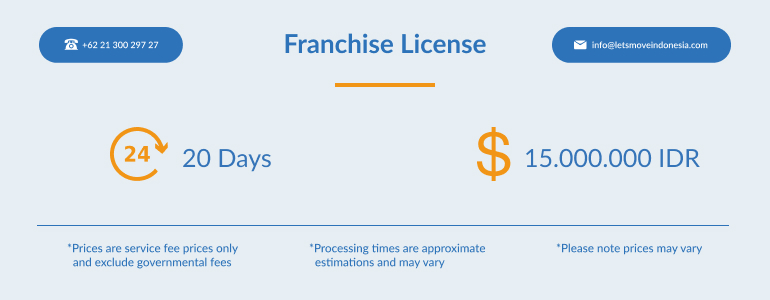
In a franchise arrangement, the franchisee usually does not own the property where they operate. Instead, they have the “right to use” the franchisor’s brand and business model within a specified location. This allows franchisees to benefit from a proven business model and established brand recognition without the need for extensive property investment.
Steps to get your Export Licenses with Lets Move Indonesia
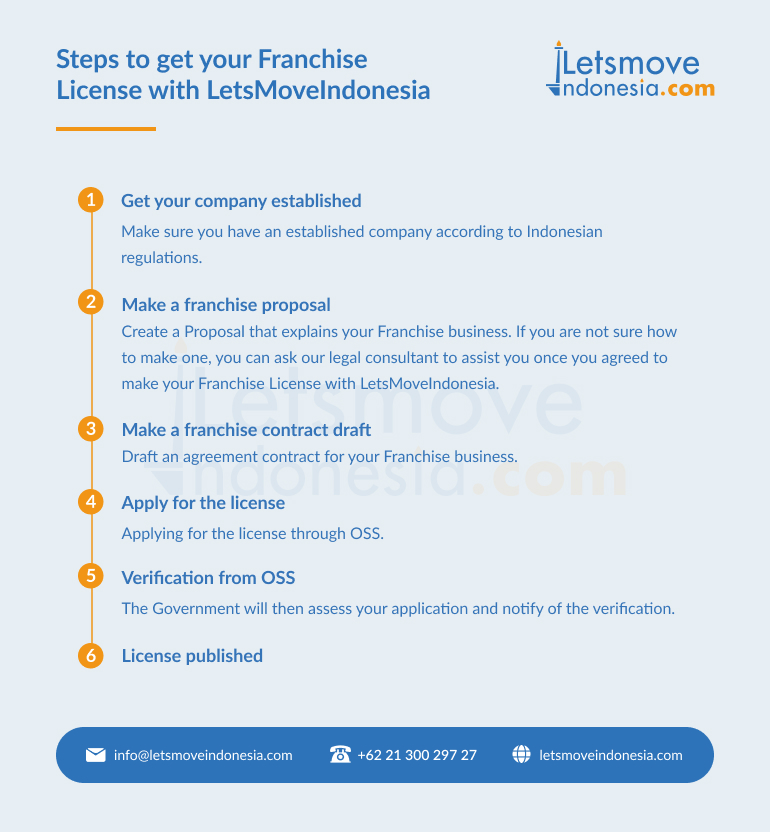
- Get your Company Established
- Make sure you have an established company according to Indonesian regulations.
- Make a Franchise Proposal
- Create a Proposal that explains your Franchise business. If you are not sure how to make one, you can ask our legal consultant to assist you once you agreed to make your Franchise License with Lets Move Indonesia.
- Make a Franchise Contract Draft
- Draft an agreement contract for your Franchise business.
- Apply for the License
- Applying for the license through OSS
- Verification from OSS
- The Government will then assess your application and notify of the verification.
- License Published
Pros and Cons of Franchising vs Setup Your Own Business
Features | Franchising | Setting Up Your Own Business |
|---|---|---|
Brand Recognition | Established brand and reputation, attracting customers more easily. | Building brand recognition and customer loyalty takes time and effort. |
Business Model | Proven business model, reducing the risk of failure | Flexibility to create and adapt your own unique business model. |
Support | Training, marketing, and operational support from the franchisor. | You are responsible for all aspects of business operations and support. |
Costs | Franchise fee, ongoing royalties, and marketing fees can be expensive. | Lower initial costs but may incur higher expenses for marketing and development. |
Control | Limited control over business operations and decision-making, following the franchisor’s rules. | Full control over all aspects of your business. |
Agreement | Franchise agreement may include restrictions on pricing, products, and territories. | No restrictions, but you are solely responsible for legal and regulatory compliance. |
Relationship | Business relationship is established with the franchisor, requiring adherence to their standards. | You are independent and not bound by any franchisor relationship. |
Disclosure | Franchise disclosure documents provide detailed information about the franchise. | You are responsible for researching and understanding all aspects of your business. |
Expansion | Potential for easier expansion with the franchisor’s support. | Expanding your business may be more challenging and require additional resources. |
Innovation | Limited ability to innovate or change the business model. | Freedom to innovate and adapt your business to market trends and customer needs. |
Exit Strategy | License to use the brand may have restrictions on selling or transferring the business. | Greater flexibility in selling or transferring your business. |
The specific terms and conditions of a franchise agreement will vary depending on the franchisor and the industry. It’s essential to thoroughly review the franchise disclosure documents and seek legal advice before entering into any licensing and franchising agreement.
Requirements
There are certain classifications for Franchisors and Franchisees that require different prerequisite documents to file in order to obtain a Franchise License:
New Application for STPW of Franchisor from Overseas
- Copy of Franchise Offering Prospectus
- Copy of business legality
New Application for Franchisee STPW originating from Overseas Franchises
- Copy of Technical Licence
- Copy of Franchise Offering Prospectus from Franchisor
- Copy of Franchise Agreement
- Copy of Company Registration Certificate (TDP)
- Copy of the Franchisor's STPW
- Copy of the Company's Deed of Establishment and/or Deed of Amendment that has been authorised by the Authorised Agency
- Copy of Proof of IPR Registration
- Copy of ID Card of the Company Owner/Responsible Person
New Application for STPW for Advanced Franchisor from Overseas
- Copy of Technical Licence
- Copy of Franchise Offering Prospectus
- Copy of Company Registration Certificate (TDP);
- Copy of STPW as Franchisee
- Copy of the Company's Deed of Establishment and/or Deed of Amendment that has been ratified by the Authorised Agency
- Copy of Proof of IPR Registration
- Copy of ID Card of the Company Owner/Responsible Person
New Application for STPW Franchisor originating from within the country
- Copy of Technical Licence
- Copy of Franchise Offering Prospectus
- Copy of Company Registration Certificate (TDP)
- Copy of Company Establishment Deed and/or Deed of Amendment that has been authorised by the Authorised Agency
- Copy of Proof of IPR Registration
- Copy of ID Card of the Company Owner/Responsible Person
New Application for STPW for Advanced Franchisor from Overseas
- Copy of Technical Licence
- Copy of Franchise Offering Prospectus
- Copy of STPW as Franchisee
- Copy of the Company's Deed of Establishment and/or Deed of Amendment that has been ratified by the Authorised Agency
- Copy of Proof of IPR Registration
- Copy of ID Card of the Company Owner/Responsible Person
New Application for STPW for Franchisee originating from Domestic Franchises
- Copy of Technical Licence
- Copy of Franchise Offering Prospectus from Franchisor
- Copy of Franchise Agreement
- Copy of Company Registration Certificate (TDP)
- Copy of the Franchisor's STPW
- Copy of the Company's Deed of Establishment and/or Deed of Amendment that has been authorised by the Authorised Agency
- Copy of Proof of IPR Registration
- Copy of ID Card of the Company Owner/Responsible Person
New Application for STPW for Advanced Franchisee derived from Overseas Franchises
- Copy of Technical Licence
- Copy of Franchise Offering Prospectus from Franchisor
- Copy of the Franchise Agreement
- Copy of Company Registration Certificate (TDP)
- Copy of the Franchisor's STPW
- Copy of the Company's Deed of Establishment and/or Deed of Amendment that has been authorised by the Authorised Agency
- Copy of Proof of IPR Registration
- Copy of ID Card of the Company Owner/Responsible Person
New Application for STPW for Continuing Franchisee derived from Domestic Franchises
- Copy of Technical Licence
- Copy of Franchise Offering Prospectus from Franchisor
- Copy of the Franchise Agreement
- Copy of Company Registration Certificate (TDP)
- Copy of the Franchisor's STPW
- Copy of the Company's Deed of Establishment and/or Deed of Amendment that has been authorised by the Authorised Agency
- Copy of Proof of IPR Registration
- Copy of ID Card of the Owner/Person in Charge of the Company
Application for STPW extension:
- Original Franchise Registration Certificate (STPW)
- Other documents if there are data changes from the documents submitted 5 years earlier. To learn more about the type of other licences you need to acquire, contact our legal advisors and get your FREE consultations
- Share :
Popular Services
Interesting News

Contact Us
Speak to Our Team Now to Get Your Free Consultation!

More of Our Popular Indonesia Legal Services
Stay informed with the latest Indonesia Visa & Business updates.

Latest News
Get to Know Latest Business & Visa Updates
Bali has become a top choice for foreigners to invest in real estate. But research on the property market can be tricky if you are unaware of the local laws and regulations. The good news is that buy a property in Bali is actually a possibility for foreign investors, yet there are regulations and rules on […]
Lets Move Indonesia
03/25/2025
Indonesia property market in 2025 is presenting a golden chance to investors. Rapidly growing economy, urbanization, and favorable government policies, now it is the right time to enter into this market. Let’s discover more about it. Current Trends in the Indonesia Property Market The Indonesian economic growth train on track with an annual increase rate […]
Lets Move Indonesia
03/25/2025
The Ministry of Finance (MoF) on October 18, 2024 introduced Regulation No. 81 (MoF-81) to streamline and develop different tax regulations. This was done in order to ensure that the new CoreTax Administration System (CoreTax) would be effective from 1 January 2025. This is a major reform effort that seeks to improve the effectiveness, reliability […]
Lets Move Indonesia
01/30/2025
17th of January, 2025 – Aligning with the regulation change in Indonesia regarding adjustments to the Penerimaan Negara Bukan Pajak (PNBP), or Non-Tax State Revenue in 2024, Lets Move Indonesia as the Indonesia announces a revised pricing structure for our comprehensive services. This adjustment isn’t simply a response to regulatory changes, it reflects a reaffirmation […]
Lets Move Indonesia
01/17/2025
Indonesia welcomed the inauguration of its membership in BRICS organisation after being announced by the 2025 Chair of BRICS, Brazil on Monday, (6/1/2025). Through the official statement, the Ministry of Foreign Affairs confirmed that the membership in BRICS represents a strategic step to strengthen democratic collaboration with other developing countries under the framework of inclusivity, […]
Lets Move Indonesia
01/12/2025
Indonesia’s tax system continues to play a pivotal role in supporting national development and achieving fiscal sustainability. However, enhancing tax revenue remains a significant challenge for the government, as annual targets consistently rise amidst various obstacles. As of 31 October 2024, Indonesia tax revenue reached IDR 1,517.5 trillion, approximately 76.3% of the State Budget (APBN) […]
Lets Move Indonesia
01/02/2025
